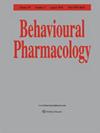大麻二酚油对 Sprague-Dawley 大鼠的辨别刺激作用。
IF 1.6
4区 心理学
Q3 BEHAVIORAL SCIENCES
引用次数: 0
摘要
大麻二酚(CBD)是大麻中具有中枢活性的主要植物大麻素成分之一,美国食品和药物管理局仅批准其用于治疗与三种罕见疾病相关的癫痫发作。它还被吹捧为治疗焦虑症的潜在药物,以取代苯二氮卓等传统疗法。虽然有一些证据表明 CBD 有抗焦虑作用,但它是否适合替代苯二氮卓类药物还不得而知。本实验旨在评估 CBD 与抗焦虑药物氯氮卓(CDP)(一种苯二氮卓类药物)在多大程度上具有互感性鉴别刺激特性。在本实验中,给雄性 Sprague-Dawley 大鼠注射了不同剂量(0-1569 毫克/千克)的非处方 CBD 油,训练它们从生理盐水中分辨出 5.6 毫克/千克的 CDP。由于 CBD 具有长时程效应,因此在给药后 90 分钟和 120 分钟进行了泛化测试。测试发现,两种最高剂量的 CBD(1064 毫克/千克和 1569 毫克/千克)可部分替代 5.6 毫克/千克 CDP,在第 2 个时间点(CBD 给药后 120 分钟),对 CDP 相关杠杆的平均反应百分比达到 20% 以上,这表明本实验中使用的高剂量非处方 CBD 油在某种程度上与 CDP 具有相同的互感性分辨刺激特性。与现有的关于 CBD 刺激作用的研究相比,这些结果是新颖的。本文章由计算机程序翻译,如有差异,请以英文原文为准。
Discriminative-stimulus effects of cannabidiol oil in Sprague-Dawley rats.
Cannabidiol (CBD) is one of the major centrally active phytocannabinoid components of cannabis, and has been approved by the FDA only for the treatment of seizures associated with three rare disorders. It has also been touted as a potential treatment for anxiety in place of more traditional treatments like benzodiazepines. Although there is some evidence of anxiolytic effects of CBD, its suitability as a substitute for benzodiazepines is unknown. This experiment was designed to assess the extent to which CBD shares interoceptive discriminative-stimulus properties with the anxiolytic drug chlordiazepoxide (CDP), a benzodiazepine. In the present experiment, a range of doses (0-1569 mg/kg) of over-the-counter CBD oil was administered (i.g.) in male Sprague-Dawley rats trained to discriminate 5.6 mg/kg CDP from saline. Due to the long time-course effects of CBD, generalization tests were conducted at 90 and 120 min post-CBD administration. The two highest doses of CBD tested (1064 and 1569 mg/kg) were found to partially substitute for 5.6 mg/kg CDP, with mean percent responding on the CDP-associated lever reaching above 20% at time 2 (120 min post-CBD administration), suggesting that high doses of the over-the-counter CBD oils used in this experiment share interoceptive discriminative-stimulus properties to some degree with CDP. These results are novel in comparison to existing research into stimulus effects of CBD, in which substitution for benzodiazepines has not previously been observed.
求助全文
通过发布文献求助,成功后即可免费获取论文全文。
去求助
来源期刊

Behavioural Pharmacology
医学-行为科学
CiteScore
3.40
自引率
0.00%
发文量
84
审稿时长
6-12 weeks
期刊介绍:
Behavioural Pharmacology accepts original full and short research reports in diverse areas ranging from ethopharmacology to the pharmacology of schedule-controlled operant behaviour, provided that their primary focus is behavioural. Suitable topics include drug, chemical and hormonal effects on behaviour, the neurochemical mechanisms under-lying behaviour, and behavioural methods for the study of drug action. Both animal and human studies are welcome; however, studies reporting neurochemical data should have a predominantly behavioural focus, and human studies should not consist exclusively of clinical trials or case reports. Preference is given to studies that demonstrate and develop the potential of behavioural methods, and to papers reporting findings of direct relevance to clinical problems. Papers making a significant theoretical contribution are particularly welcome and, where possible and merited, space is made available for authors to explore fully the theoretical implications of their findings. Reviews of an area of the literature or at an appropriate stage in the development of an author’s own work are welcome. Commentaries in areas of current interest are also considered for publication, as are Reviews and Commentaries in areas outside behavioural pharmacology, but of importance and interest to behavioural pharmacologists. Behavioural Pharmacology publishes frequent Special Issues on current hot topics. The editors welcome correspondence about whether a paper in preparation might be suitable for inclusion in a Special Issue.
 求助内容:
求助内容: 应助结果提醒方式:
应助结果提醒方式:


